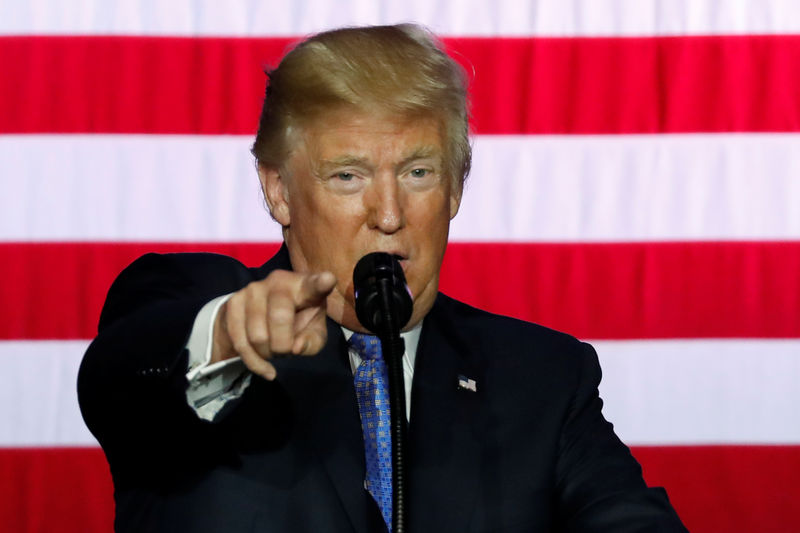By David Morgan and Richard Cowan
WASHINGTON (Reuters) - President Donald Trump on Wednesday proposed the biggest U.S. tax overhaul in three decades, offering to cut taxes for most Americans but prompting criticism that the plan favors the rich and companies and could add trillions of dollars to the deficit.
The proposal, which the Republican president said was aimed at helping working people, creating jobs and making the tax code more simple and fair, faces an uphill battle in Congress with Trump's own party divided and Democrats hostile.
The plan would lower corporate income tax rates, cut taxes for small businesses, reduce the top income tax rate for individuals and scrap some widely used tax breaks including one that benefits people in high-tax states dominated by Democrats.
Forged during months of talks among Trump's aides and top Republicans in Congress, the plan contained scant details about how to pay for the cuts without fueling deficits. It must be turned into detailed legislation by the Republican-led congressional tax-writing committees.
Speaking at an event in Indianapolis, Trump called the plan the largest tax cut in U.S. history and "historic tax relief to the American people."
"This is a once-in-a-generation opportunity," Trump said. "We want tax reform that is pro-growth, pro-jobs, pro-worker, pro-family and yes tax reform that is pro-American."
Trump, a real estate mogul-turned-politician who promised big tax cuts as a candidate last year, said earlier on Wednesday when asked by reporters that he personally would not stand to gain financially from the proposal.
"I think there's very little benefit for people of wealth," said Trump, who has refused to make public his own tax returns unlike many of his White House predecessors.
Republicans have produced no major legislative successes since Trump took office in January even though they control the White House and both chambers of Congress.
The Republicans' top legislative priority, an overhaul of the U.S. healthcare system, collapsed in the Senate on Tuesday, while another key item on Trump's wish list, infrastructure spending, has yet to materialize.
A comprehensive rewrite of the U.S. tax code has eluded lawmakers for decades. The last one was passed in 1986.
The White House said that under the proposal typical middle-class families would have less of their income subject to federal income tax. Trump noted that the first $12,000 earned by an individual and the first $24,000 by a married couple would be tax-free.
The plan would lower the top individual rate from to 35 percent from 39.6 percent.
It foresees a 20 percent corporate income tax rate, down from the current 35 percent but not as low as Trump's initial demand for 15 percent.
Companies in the United States pay high taxes by global standards but many of them pay much less than the headline rate due to loopholes and tax breaks.
The proposal now faces a long legislative process that could take months. Trump has appealed to Democrats to support the plan, although they were not consulted in drafting it.
'HOLDING THE BAG'
"Under this plan, the wealthiest Americans and wealthiest corporations make out like bandits while middle-class Americans are left holding the bag," said Chuck Schumer, the top Senate Democrat.
Republicans hold a thin 52-48 majority in the Senate and may need some Democrats on board to win passage. But Democrats said the plan would expand the federal deficit in order to deliver tax cuts to wealthy Americans rather than the middle-class families that Trump and Republicans say they are trying to help.
"If this framework is all about the middle class, then Trump Tower is middle-class housing," said Senator Ron Wyden, the top Democrat on the Senate Finance Committee.
Kevin Brady, chairman of the tax-writing House of Representatives Ways and Means Committee, said he expected tax legislation to be passed by the end of this year.
House Speaker Paul Ryan, a Republican, said, "This is a now-or-never moment."
The White House and congressional Republicans did not give an estimate of the plan's cost or how much it might add to federal deficits. The Committee for a Responsible Federal Budget policy group on Wednesday estimated that the plan contains about $5.8 trillion over a decade of total tax cuts and would have a net cost of $2.2 trillion through 2027.
Analysts have warned that huge tax cuts would balloon the federal deficit and debt if economic growth projected by Republicans to offset the costs fails to materialize amid rising interest rates.
The tax framework would establish a 25-percent rate for business income from businesses called "pass-throughs." These usually small, private enterprises represent an estimated that 95 percent of all U.S. businesses.
Under current tax law, business profits are "passed through" to owners as personal income, which is often taxed at the top 39.6 percent individual income tax rate.
Republicans proposed eliminating some existing tax deductions, though they retain deductions for mortgage interest payments and charitable deductions. They proposed scrapping the deduction for the amount a taxpayer pays in state and local taxes, which could hurt people in high-tax states including California and New York that tend to vote Democratic.
The plan, which would retain deductions for mortgage interest payments and charitable deductions, aims to consolidate the current seven tax brackets into three brackets of 12 percent, 25 percent and 35 percent.

The proposal was embraced by the U.S. Chamber of Commerce business lobbying group and an organization called the RATE Coalition representing large American companies including AT&T Inc (N:T), FedEx Corp (N:FDX), Home Depot Inc (N:HD), General Dynamics Corp (N:GD) and Walmart Stores Inc (N:WMT).